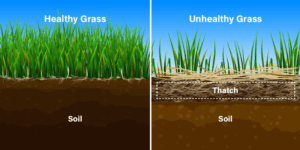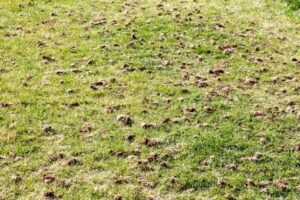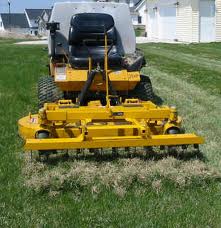Taking the time to dethatch a lawn is important because it keeps grass healthy and looking its best. Dethatching prevents problems such as compaction and thatch build-up which kills grass. Removing excess thatch will aerate the soil and give grass the conditions necessary to flourish. Dethatching allows air, water, and nutrients to reach the root area of your grass, promoting a lush, healthy lawn.

What is Thatch?
This cross-section of soil and grass roots shows the layer of organic debris known as thatch. A mix of living and dead plant material, thatch forms at the base of grass blades, where stems meet roots and soil. Organic matter in our lawns like grass clippings or dead leaves, break down differently. When the buildup of these materials accumulates faster than decomposition breakdown, a lawn’s thatch layer gets thicker. Some layer of thatch is beneficial for lawn health because it helps the soil preserve moisture and can protect delicate grass roots from large temperature fluctuations.
How Thatch Kills Your Lawn
When the thatch layer is allowed to build up and gets too thick, grass health suffers and eventually the grass will die in these areas. Too much thatch has the opposite effect of the benefits – blocking water and nutrients, stressing grass roots, and leaving the lawn vulnerable to drought and damage. A thick thatch layer also offers the perfect breeding ground for insects, pests, and disease.
Does Your Lawn Need Dethatching?
Different species of grasses have different rates of thatch build up. Grasses that spread vigorously usually need dethatching more often than other grasses. Soil pH, soil base, fertilization and pesticide use, and/or compacted soils also impacts the rate of thatch development. Once the thatch layer gets greater than 1-inch, it becomes detrimental to the health of the grass. If your lawn has begun to look discolored or is thinning, it may be indicating the need for dethatching.
How to Measure Thatch
Use a spade to remove a section of lawn, including grass and soil, about 3-inches thick. The thatch layer will be directly on top of soil. Measure the thickness of this layer, and if it’s more than ½-inch, it’s time to plan for dethatching.
When to Dethatch
Once you’ve determined that your lawn needs dethatching, it should be done during active grass growing times. This will help your lawn recover and new growth to initiate quickly. Spring and early summer are perfect dethatching times. Never dethatch when a lawn is dormant as this can cause further serious damage to the lawn.
How to Dethatch
Dethatching is done in one of three methods:
- Manual dethatching uses heavy, short-tined rakes with a curved blade that digs into the lawn and pulls up thatch as you rake.
- Power rakes are mower-like machines with rotating tines that dig into thatch at the soil level and pull it up.
- Vertical mowers use vertical blades to slice down through the thatch layer and into the soil. They pull thatch, as well as grass roots at times, to the surface as they go.
Being too aggressive with dethatching, or removing too much thatch at once, can damage grass roots. If you have a very thick thatch layer, hiring a professional for the project is a smart idea.
 AC Yard Services is Here for Professional Lawncare Help
AC Yard Services is Here for Professional Lawncare Help
If you’d like help with dethatching your lawn, or other yard chores, please give us a call at (207) 712-5554 to talk with a member of our team.

 AC Yard Services is Here for Professional Lawncare Help
AC Yard Services is Here for Professional Lawncare Help